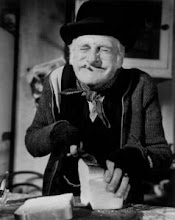Tuesday 20 May 2008
Eurovision row
Update (21st May 2008) Sadly, Ireland's Dustin the Turkey didn't make it past the semi-finals.
Monday 19 May 2008
How many times can a politician avoid answering the question?
Tuesday 6 May 2008
Is "their" a possessive pronoun or a possessive adjective?
c.1200, from O.N. þierra, gen. of þeir "they". Replaced O.E. hiera. Use with singular objects, scorned by grammarians, is attested from c.1300. Theirs (c.1300) is a double possessive. Alternate form theirn (1836) is attested in Midlands and southern dialect in
O.E. ure "of us," genitive plural of the first person pronoun, from P.Gmc. *ons (cf. O.S.
Their and our are plural possessive pronouns which have a similar function / position to an adjective in standard English. But ‘their dog’ does not describe the dog but actually gives information about the people who own the dog. ‘their dog’ = the dog of them.
In English, the important function of our & their is that we can separate people grammatically for different purposes. For example, in George Bush’s speech after the attack in
